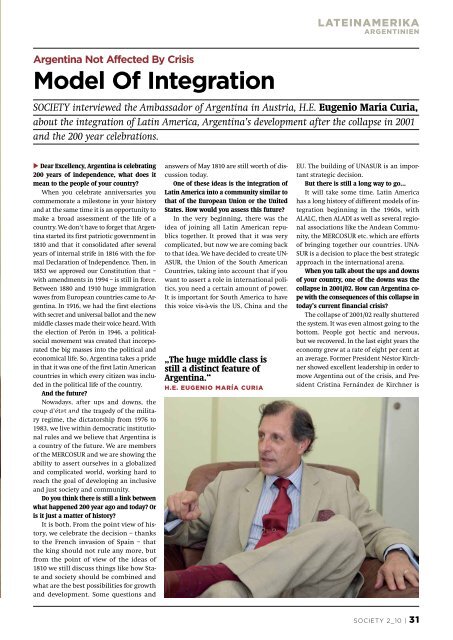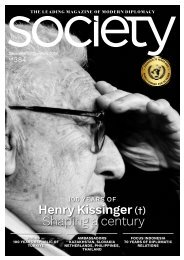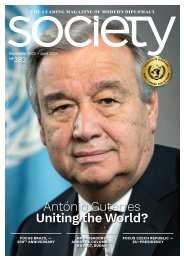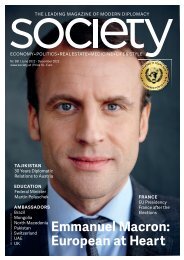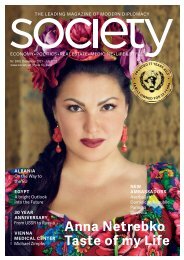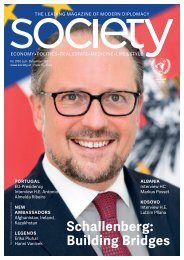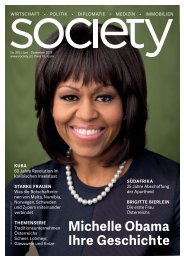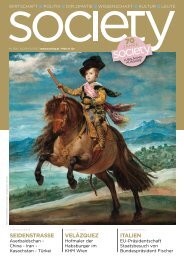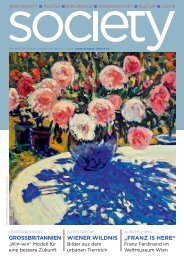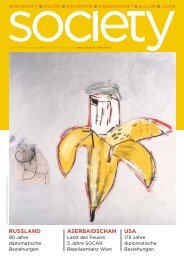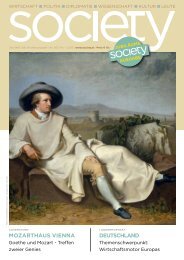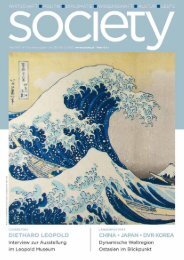SOCIETY 354 /2010
Sie wollen auch ein ePaper? Erhöhen Sie die Reichweite Ihrer Titel.
YUMPU macht aus Druck-PDFs automatisch weboptimierte ePaper, die Google liebt.
Argentina Not Affected By Crisis<br />
Model Of Integration<br />
LATEINAMERIKA<br />
ARGENTINIEN<br />
<strong>SOCIETY</strong> interviewed the Ambassador of Argentina in Austria, H.E. Eugenio María Curia,<br />
about the integration of Latin America, Argentina’s development after the collapse in 2001<br />
and the 200 year celebrations.<br />
Dear Excellency, Argentina is celebrating<br />
200 years of independence, what does it<br />
mean to the people of your country?<br />
When you celebrate anniversaries you<br />
commemorate a milestone in your history<br />
and at the same time it is an opportunity to<br />
make a broad assessment of the life of a<br />
country. We don’t have to forget that Argentina<br />
started its first patriotic government in<br />
1810 and that it consolidated after several<br />
years of internal strife in 1816 with the formal<br />
Declaration of Independence. Then, in<br />
1853 we approved our Constitution that –<br />
with amendments in 1994 – is still in force.<br />
Between 1880 and 1910 huge immigration<br />
waves from European countries came to Argentina.<br />
In 1916, we had the first elections<br />
with secret and universal ballot and the new<br />
middle classes made their voice heard. With<br />
the election of Perón in 1946, a politicalsocial<br />
movement was created that incorporated<br />
the big masses into the political and<br />
economical life. So, Argentina takes a pride<br />
in that it was one of the first Latin American<br />
countries in which every citizen was included<br />
in the political life of the country.<br />
And the future?<br />
Nowadays, after ups and downs, the<br />
df.ldflkjdfh kdhflkdfh lnk dfh kndh<br />
coup d’état and the tragedy of the military<br />
regime, the dictatorship from 1976 to<br />
fkndfh nkh dfknldfh kn<br />
1983, we live within democratic institutional<br />
rules and we believe that Argentina is<br />
a country of the future. We are members<br />
of the MERCOSUR and we are showing the<br />
ability to assert ourselves in a globalized<br />
and complicated world, working hard to<br />
reach the goal of developing an inclusive<br />
and just society and community.<br />
Do you think there is still a link between<br />
what happened 200 year ago and today? Or<br />
is it just a matter of history?<br />
It is both. From the point view of history,<br />
we celebrate the decision – thanks<br />
to the French invasion of Spain – that<br />
the king should not rule any more, but<br />
from the point of view of the ideas of<br />
1810 we still discuss things like how State<br />
and society should be combined and<br />
what are the best possibilities for growth<br />
and development. Some questions and<br />
answers of May 1810 are still worth of discussion<br />
today.<br />
One of these ideas is the integration of<br />
Latin America into a community similar to<br />
that of the European Union or the United<br />
States. How would you assess this future?<br />
In the very beginning, there was the<br />
idea of joining all Latin American republics<br />
together. It proved that it was very<br />
complicated, but now we are coming back<br />
to that idea. We have decided to create UN-<br />
ASUR, the Union of the South American<br />
Countries, taking into account that if you<br />
want to assert a role in international politics,<br />
you need a certain amount of power.<br />
It is important for South America to have<br />
this voice vis-à-vis the US, China and the<br />
„The huge middle class is<br />
still a distinct feature of<br />
Argentina.“<br />
H.E. EUGENIO MARÍA CURIA<br />
EU. The building of UNASUR is an important<br />
strategic decision.<br />
But there is still a long way to go…<br />
It will take some time. Latin America<br />
has a long history of different models of integration<br />
beginning in the 1960s, with<br />
ALALC, then ALADI as well as several regional<br />
associations like the Andean Community,<br />
the MERCOSUR etc. which are efforts<br />
of bringing together our countries. UNA-<br />
SUR is a decision to place the best strategic<br />
approach in the international arena.<br />
When you talk about the ups and downs<br />
of your country, one of the downs was the<br />
collapse in 2001/02. How can Argentina cope<br />
with the consequences of this collapse in<br />
today’s current financial crisis?<br />
The collapse of 2001/02 really shuttered<br />
the system. It was even almost going to the<br />
bottom. People got hectic and nervous,<br />
but we recovered. In the last eight years the<br />
economy grew at a rate of eight per cent at<br />
an average. Former President Néstor Kirchner<br />
showed excellent leadership in order to<br />
move Argentina out of the crisis, and President<br />
Cristina Fernández de Kirchner is<br />
<strong>SOCIETY</strong> 2_10 | 31


